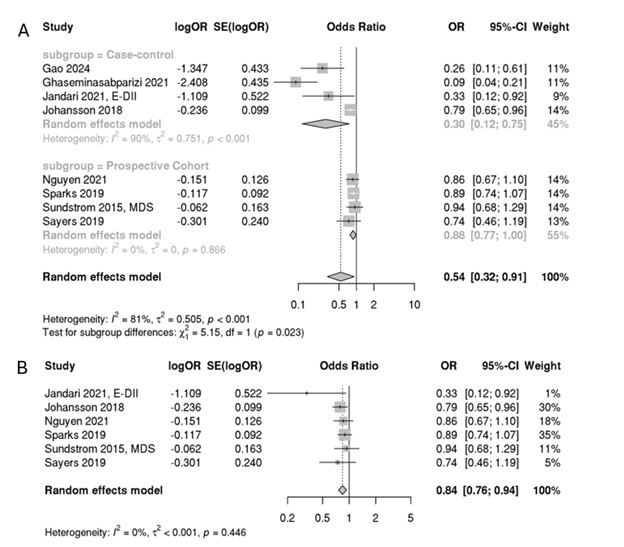Session Information
Session Type: Poster Session B
Session Time: 10:30AM-12:30PM
Background/Purpose: Healthy dietary patterns are associated with many health benefits, including lower cardiovascular disease, mortality, and rheumatoid arthritis (RA) disease activity. Therefore, we aimed to determine the degree to which a healthy dietary pattern is associated with incident RA.
Methods: We registered this systematic review and meta-analysis in PROSPERO (CRD42025645056). Inclusion criteria were validated diet (anti-inflammatory, Mediterranean, Dietary Approaches to Stop Hypertension (DASH), and/or healthy eating index [HEI]); validated RA definition; dietary exposure preceding RA; and randomized controlled trial, cohort, or case-control design. We searched CENTRAL, Embase, MEDLINE, Scopus, Web of Science, and grey literature as of 2/3/2025. Two reviewers independently screened each reference and abstracted all data, with agreement reported using Cohen’s κ. We assessed each study’s risk of bias using the Newcastle-Ottawa Scale. Meta-analyses combined adjusted odds ratios (OR) with 95% confidence interval (CI) for incident RA using random effects models. For heterogeneity, we calculated I2 and performed subgroup analyses including only the studies with lowest risk of bias and stratifying results by dietary pattern type. We assessed certainty of evidence using GRADE.
Results: The two reviewers screened a total of 796 independent references for inclusion with almost perfect agreement (Cohen’s κ 0.89, 95% CI 0.81-0.97). Ultimately, we included 12 case-control and cohort studies spanning 270,121 unique individuals in the review. Three studies were low risk of bias, 3 moderate, 3 high, and 3 very high. Among the 8 independent studies included in the meta-analysis, healthy overall dietary pattern was associated with lower risk of incident RA (OR 0.54, 95% CI 0.32-0.91, I2=81%, Figure 1A). Including only the 6 studies with the lowest risk of bias was also associated with lower RA risk (OR 0.84, 95% CI 0.76-0.94, I2=0%, Figure1B). Anti-inflammatory (OR 0.56, 95% CI 0.31-0.99), Mediterranean (OR 0.88, 95% CI 0.78-0.99), and HEI (OR 0.60, 95% CI 0.25-1.47) patterns all showed lower point estimates for RA (Figure 2). Overall level of certainty in these results was moderate due to the studies’ observational nature.
Conclusion: In observational studies, healthy dietary pattern is associated with reduced risk of incident RA. Therefore, individuals at risk for RA should consider observing a healthy dietary pattern to potentially reduce their risk of disease. In addition, these findings support inclusion of healthy dietary patterns in RA guidelines.
 Figure 1. Association between healthy overall dietary pattern and incident RA among (A) all studies and (B) in the subset of studies with the lowest risk of bias
Figure 1. Association between healthy overall dietary pattern and incident RA among (A) all studies and (B) in the subset of studies with the lowest risk of bias
.jpg) Figure 2. Association between individual healthy dietary pattern types and incident RA
Figure 2. Association between individual healthy dietary pattern types and incident RA
To cite this abstract in AMA style:
Joerns E, Sparks J, Chelf C, Crowson C, Davis J, Kronzer V. Healthy Dietary Patterns and Risk of Rheumatoid Arthritis: A Systematic Review and Meta-Analysis [abstract]. Arthritis Rheumatol. 2025; 77 (suppl 9). https://acrabstracts.org/abstract/healthy-dietary-patterns-and-risk-of-rheumatoid-arthritis-a-systematic-review-and-meta-analysis/. Accessed .« Back to ACR Convergence 2025
ACR Meeting Abstracts - https://acrabstracts.org/abstract/healthy-dietary-patterns-and-risk-of-rheumatoid-arthritis-a-systematic-review-and-meta-analysis/
